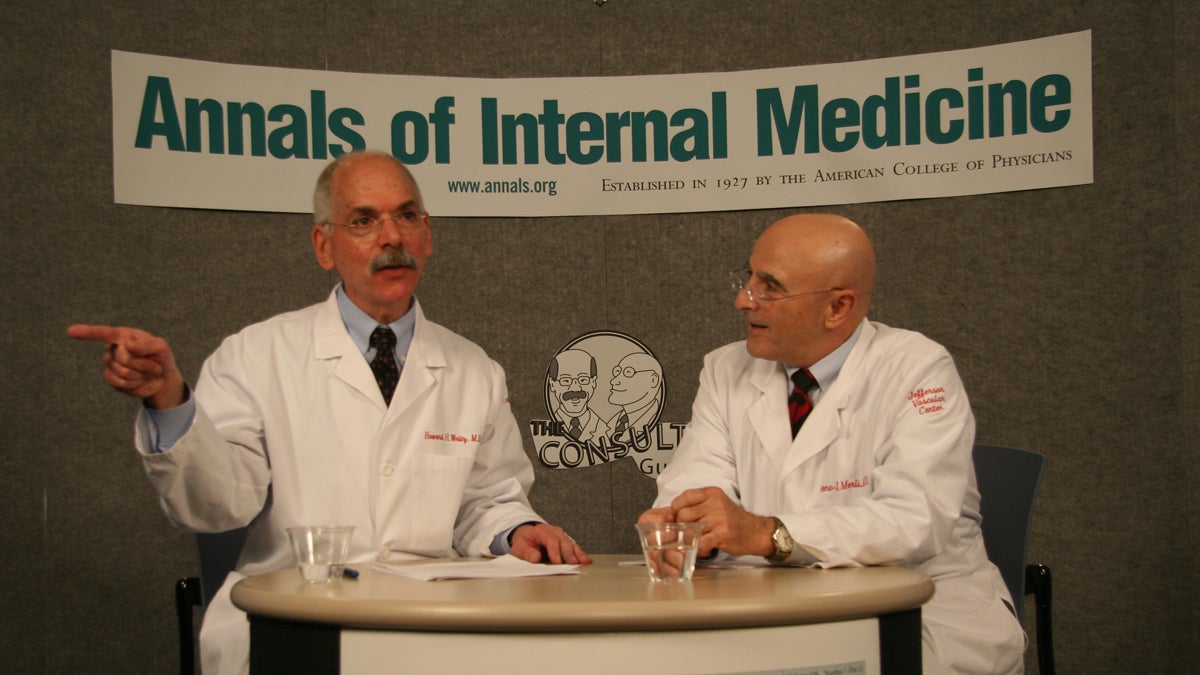Hold the PowerPoint slides – a different approach to medical education
Listen
Howard Weitz (left) and Geno Merli host "The Consult Guys" (Photo courtesy of American College of Physicians)
Two Jefferson University Hospital doctors are offering fellow physicians a different way to learn – and their approach was inspired by public radio.
Medical guidelines and research can be dry, and PowerPoint presentations are a known snooze fest! So, it can be tedious for working physicians to keep up with what’s new. Two Jefferson University Hospital doctors are offering their fellow physicians a different way to learn – and their approach was inspired by public radio.
“We love car talk,” confessed Howard Weitz, director of the division of cardiology at Jefferson Medical College in Philadelphia. “I have learned more from the Tappet brothers than most college professors I had.” Together with Geno Merli, Co-Director of the Jefferson vascular Center, Weitz hosts an online medical TV show called “The Consult Guys.” The two doctors have been friends and colleagues for over three decades, and their easy banter is part of their program.
“We have walked away from the traditional approach to education, we’re communicating with our learners in a funny and comfortable environment,” said Merli. “We make learning sticky, so it stays in your head.”
The “Consult Guys” got its start at a national conference for physicians several years ago, when the American College of Physicians asked the two docs to “do something fun” at their national meeting.
“We put together a one-hour session, with made-up questions, and made up call-ins, but the questions related to real doctor-patient issues,” recalled Weitz. “It was a riot.”
Merli and Weitz continued to do their show as a live event for several years, and the College of Physicians has started to distribute a video version of their shtick. Viewers can get credit for continuing medical education if they take a short quiz after watching a segment.
Each segment answers one question. “We research the medical literature, we look for areas of controversy and practice change,” exlained Merli. The team also solicits questions from their audience.
Merli says that the questions they get are very focused. “For example, when you have an MRI, and you have a prosthetic heart valve, is it safe to have an MRI?” The two doctors then research the answers in the medical literature, and present their findings in a conversational way, sprinkled with humor.
The “Consult Guys” show covers a wide variety of topics, that are often far outside the hosts’ areas of expertise.
“One of our most popular shows was ‘is it safe to wear a neck tie in a patient care environment,'” said Weitz. “The national health service in Great Britain banned it, assuming that it creates unsanitary conditions, so we researched the literature, and found the evidence to be skimpy at best, so we challenged that assumption.”
Weitz hopes that their educational program inspires other healthcare providers to do similar things. “The days of sitting in a lecture for an hour are long gone, it is just too painful to keep up to date that way. A focused, brief clinical teaching interaction is the way to go.”
The two docs disagree sometimes on answers, but at the conclusion of their segment, there is a clear-cut answer.
One of their favorite segments featured a question about bright green urine. A patient was having back surgery, and suddenly their urine turned green. So the question was whether in this situation the surgeon should stop operating, or keep going. Research revealed that urine color changes occur during anesthesia. “It’s a very rare but real interaction caused by Propofol, a very common anesthesia drug, it will cause no bad side effects, so you just keep on operating,” said Weitz.
Given their busy schedules as physicians, how do the two doctors have time for their show? “That’s what nights and weekends are for,” said Merli. “Geno is my closest friend, so Geno and I talk seven days a week, we always think about show ideas, and collect this info all the time,” added Weitz.
WHYY is your source for fact-based, in-depth journalism and information. As a nonprofit organization, we rely on financial support from readers like you. Please give today.




